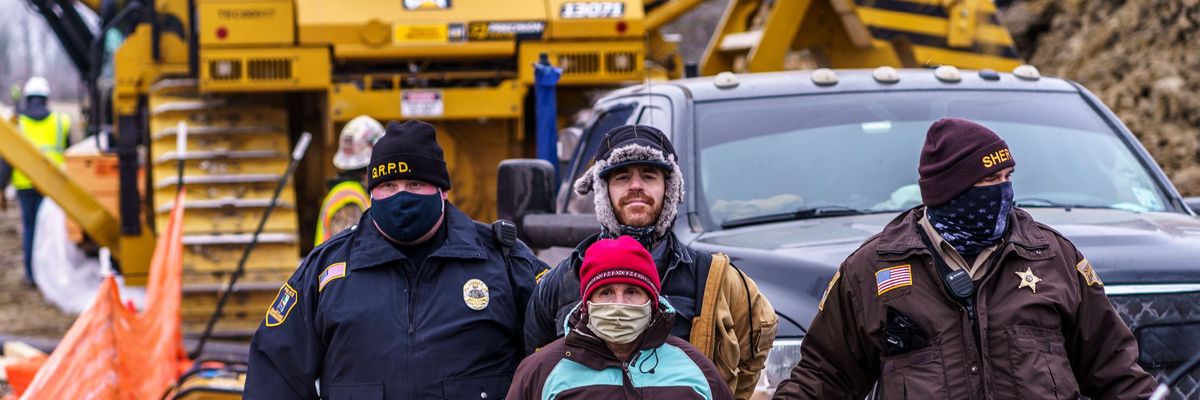With Canadian oil giant Enbridge pouring more than $4 million into a fund that was used by the law enforcement agencies which have arrested hundreds of people for protesting the company's thousand-mile-long tar sands pipeline, the prosecutor who is bringing charges against the environmental defenders believed he was also entitled to benefit from the fund, according to an independent investigation.
The Center for Protest Law and Litigation (CPLL) revealed Thursday that Jonathan Frieden, the lead prosecutor seeking to jail hundreds of opponents to the Line 3 pipeline, sought more than $12,000 last July from the so-called Line 3 Public Safety Escrow Trust, which the Minnesota Public Utilities Commission (PUC) ordered Enbridge to pay into as a condition of the pipeline's construction.
According to documents obtained by the center, Frieden wrote to Rick Hart, manager for the escrow account at the Minnesota PUC, with a bill for the hours he and his support staff worked preparing the case against Indigenous groups and other climate campaigners.
"Big Oil should not be allowed to use police officers and county attorneys as their personal security."
Hart later informed Frieden that "prosecution expenses are not an allowable reimbursable expense for the Line 3 Public Safety Escrow Account."
Enbridge--whose Line 3 pipeline transports tar sands across Indigenous lands and violates Anishinaabe treaty rights as well as threatening water safety in Minnesota--has acknowledged that it funneled $2.9 million into the fund which benefited sheriffs' departments and other law enforcement agencies as they cracked down on anti-pipeline protests.
The money has been used to conduct patrols along the pipeline and to reimburse law enforcement agencies for protective gear, transportation, lodging, and meals while they've made hundreds of arrests.
As Frieden pursued charges for trespassing, theft, "unlawful assembly," and other misdemeanors and felonies--which are "meant to intimidate and dissuade free speech and to dissuade further protests" rather than protect public safety, according to campaigners--he sought funding from the oil giant.
The prosecutor pushed back when he was informed the escrow account couldn't be used by him and his staff, saying their work "to charge the individuals endangering the public" should "qualify under public safety."
Frieden's "expectation of funding incentivized the wrongful charging of hundreds," said CPLL.
"Who's next to violate [the] constitutional rights of water protectors and ask Big Oil to pay for it?" asked Katie Redford, co-founder of Earth Rights International.
The state-run account to which Enbridge has contributed millions of dollars "essentially privatizes public police forces to act in service to the private pecuniary interests of this foreign corporation against its political opponents and the Indigenous community and to stop and disrupt peaceful organizing and expression that would educate the larger community and national audience about the environmental devastation and danger posed by the Line 3 pipeline," said CPLL.
Frieden's request suggests he believed that the company was also using "county attorneys as their personal security," said Jane Fleming Kleeb, chair of the Nebraska Democratic Party.
"This should never be happening," tweeted Kleeb.

